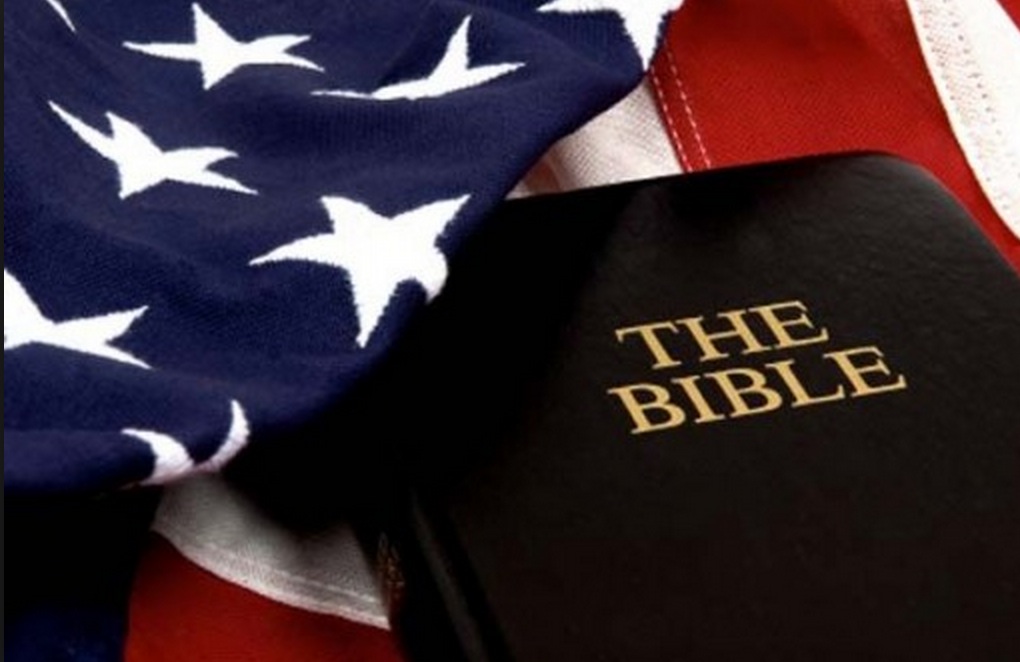[dropcap size=small]H[/dropcap]istorian and chairman of the history department at prestigious Hillsdale College in Michigan, Mark A. Kalthoff, was asked recently in an interview to weigh in on the controversy regarding America’s Christian origins (or perhaps lack thereof). While Dr. Kalthoff’s answer kind of skirted around a direct response to his personal views on the matter, I think his objective position based on the dialogue he had with the interviewer can be summed up in a single statement:
Was America founded as a Christian nation? No, not really. But after all, that shouldn’t matter.
What Kalthoff goes on to elaborate on this point is that while one could technically consider America a “Christian” nation by the way its citizens have always historically identified themselves, there was never any explicit identification in the United States’ founding documents that linked its government to any form of established religion, let alone Christianity specifically.
However, as Dr. Kalthoff points out, there are plenty of instances where just the opposite is true, the First Amendment of America’s Bill of Rights merely the most prominent among many. It is also important to note, as Dr. Kalthoff does, that theocracy and other such official marriages of government and religion had historically reaped nothing but negative, oppressive results for the citizens of such countries, and the American founders recognized that and wanted an entirely, intentionally secular foundation this time around so as to avoid religious tyranny and simultaneously preserve the religious autonomy of the individual.
So, why politicize this? Well, the religious right holds much political sway these days, especially in GOP circles. This is why many Republican candidates, especially in the 1980s at the height of the poisonous American Reconstruction movement, can be seen spouting so much misinformation regarding just how “Christian” the origins of the United States truly were.
Fortunately, we now live in the age of the Internet where such revisionist history claims can be easily researched and debunked. Still, that hasn’t completely stopped all political types from perpetuating this nonsense. Therefore, we still see intellectuals and academics such as Dr. Kalthoff pestered about it when it is a question that should have been long-buried by now.
Is America a Christian nation? Demographically speaking, yes; historically, never in any official capacity. For how can a nation truly call itself free or celebrate the idea of liberty if it combats both and receives neither by explicitly endorsing one particular religion at the exclusion of all others? Luckily, we do have the First Amendment to back up this argument – never let anyone try to tell you otherwise.
Full interview + transcript with Dr. Mark A. Kalthoff of Hillsdale College below:
John J. Miller:
Now, this is the most popular subject for debate on the discussion board. Let me boil it down to a simple question. Is America a Christian nation?
Mark Kalthoff:
Well, that’s a hot question. In fact, it’s so hot that I finally consented, in this semester here on campus with my students, [to teach] a seminar entitled, “Was the United States Founded as a Christian Nation?” If we had time to do a whole course, I probably could fill that up, so that I can’t say too much. The real first question is, “What would it mean for us to be a Christian nation?” It seems to me that how we answer that question determines whether we would answer yes or no. For example, first we might ask, is there specifically biblical, religious, or Christian language in particular seminal documents, such as the Declaration or the Constitution or certain proclamations from the Continental Congresses or certain important ordinances?
If we go with that, we would say, “Well, sometimes. The Constitution, other than ‘year of our Lord’ doesn’t mention God.” In fact, there’s a book called The Godless Constitution. The Declaration of Independence mentions God four times. The Northwest Ordinance article 3 begins with the language; “religion, morality, and knowledge being necessary to good government and the happiness of mankind, schools and the means of education shall forever be encouraged.” There seems to be an explicit statement about the link between religion, knowledge, and good government. There were fast days and Thanksgiving Day proclamations twice a year by the Continental Congress during the founding period. Some of these documents indicate a Christian emphasis. Some don’t.
On the other hand, we might ask, what about formal ties between institutional government and the church, a theocracy or established religion? In that case, no, America was not founded as a theocracy and we know that the first amendment at least limited, on the national level, Congress from doing what? Making any law respecting an establishment of religion. No formally respected church support from the national government. The simplest way in which many people argue this is [that] they ask about the beliefs, the character, or the personal self-identification of most Americans, and it turns out if you could reach back through time and ask a typical American in the late 18th century how they self identified religiously, they would say, “I’m a Christian.”
In that sense, we were a Christian nation more than we would be self-identified as a Jewish, or Muslim, or pick your other religion. The more important question, really, [is] how would saying “yes” matter? It turns out, an interesting fact of American history is that up until about the 1960s or ’70s, almost all Americans on all sides of the political spectrum identified themselves as living in a Christian nation. The question wasn’t whether Americans thought they lived in a Christian nation, it was what were the implications of that and it turned out people on both sides of the political spectrum argued that because we’re a Christian nation, their policy should come in place.
There were southerners who were ready to secede from the north because the north was full of atheist infidels because the north didn’t have a constitution that mentioned God and many southerners were proud, during the Civil War, of the fact that the southern constitution did. Of course, many northern abolitionists linked their abolitionism to their Christian confession while southern slaveholders often defended their slavery by appealing to the Bible. That’s just one episode, but it turns out every generation has that kind of idea.





3 comments
… [Trackback]
[…] Info to that Topic: thelibertarianrepublic.com/is-america-a-christian-nation/ […]
… [Trackback]
[…] Info on that Topic: thelibertarianrepublic.com/is-america-a-christian-nation/ […]
… [Trackback]
[…] There you can find 45740 more Info to that Topic: thelibertarianrepublic.com/is-america-a-christian-nation/ […]